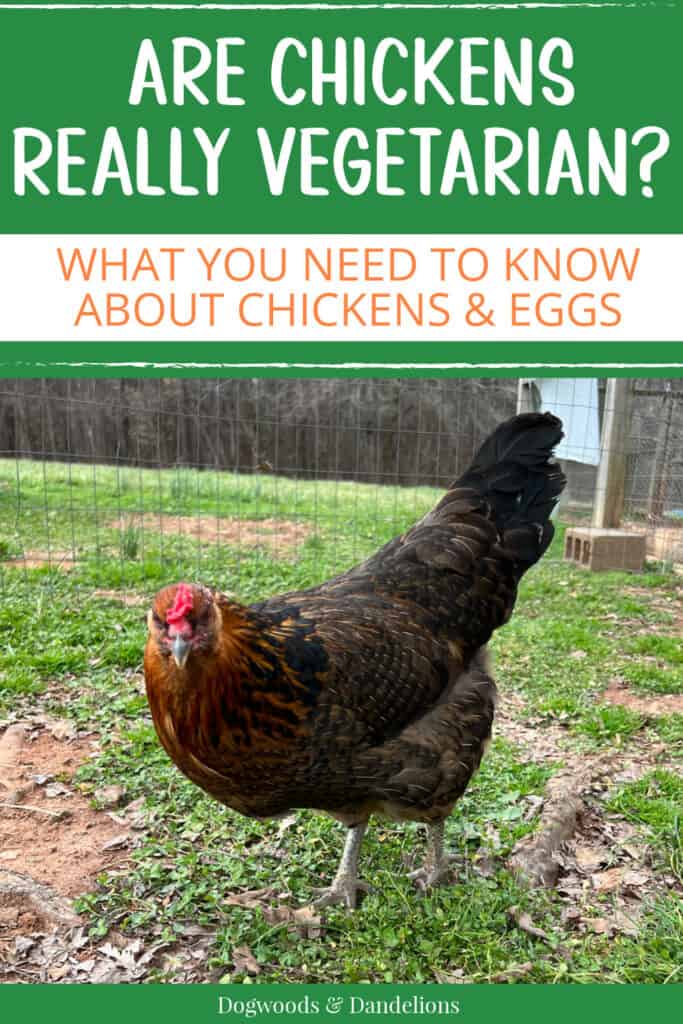Are Chickens Vegetarian?
Inside: Are chickens vegetarian? Let’s explore a chicken’s diet to see if they really should only eat plants.
With more people joining the ranks of backyard homesteaders and chicken keepers, I want to address a question that I keep seeing – Are chickens vegetarian? The short answer is NO, chickens don’t just eat plants.
What Do Chickens Really Eat?
Despite the popular claims on egg cartons touting an ‘all-natural vegetarian’ diet, chickens are far from vegetarians. If allowed to eat what they want, chickens are omnivores and will eagerly peck at anything that moves.
(In case the term is unfamiliar to you, omnivores are people or animals that eat both plants and animals.)
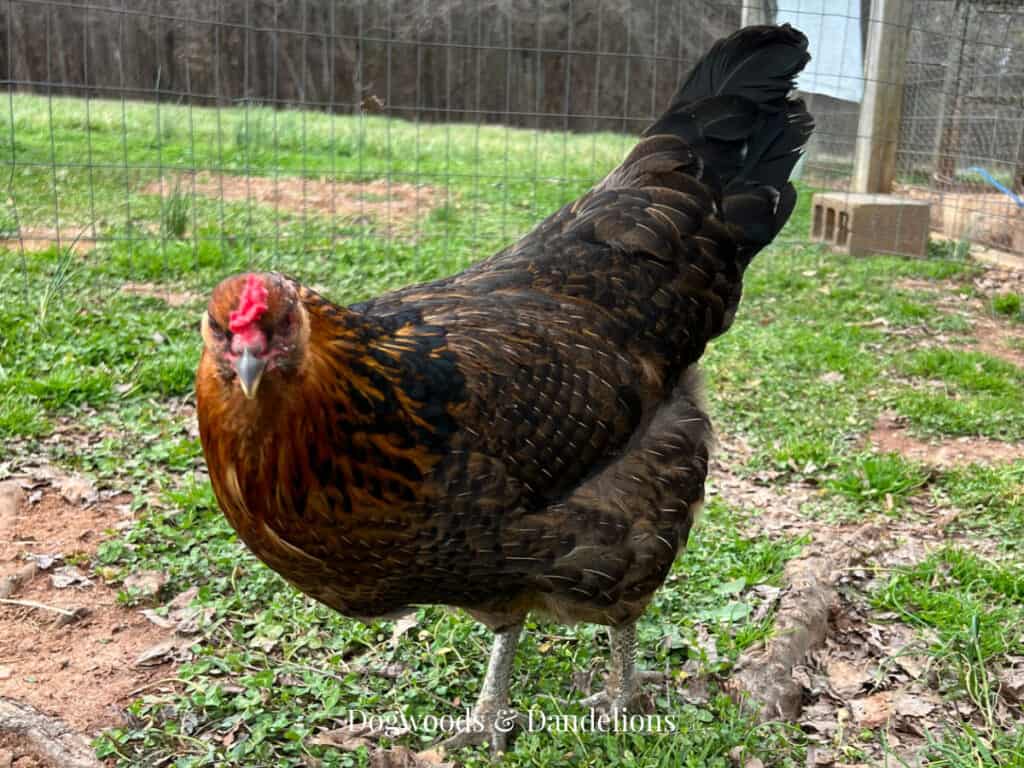
Affiliate Disclosure: Please note that some of the links in this article may be affiliate links and I may receive a small commission if you purchase something through a link. It will not change your cost. As an Amazon Associate, I earn from qualifying purchases. For more information, see my disclosures page.)
If you watch chickens in the wild you will notice that they are constantly scratching the ground for protein-packed morsels like insects, worms, and even small lizards or mice. Most chickens spend the day foraging enthusiastically for these critters, which are a major part of their diet.
While the idea of a vegetarian hen might fit well with modern narratives, (look at all the egg cartons in the grocery stores that say “vegetarian-fed”) it doesn’t address a chicken’s true dietary needs and behaviors.
The sight of hens searching for bugs, darting after a jumping cricket, or running around with a grub clenched in their beak is a picture that proves chickens aren’t vegetarian unless fed solely on chicken feed. No amount of marketing by industrial operations can prove that birds with a purely plant-based diet produce healthier eggs.
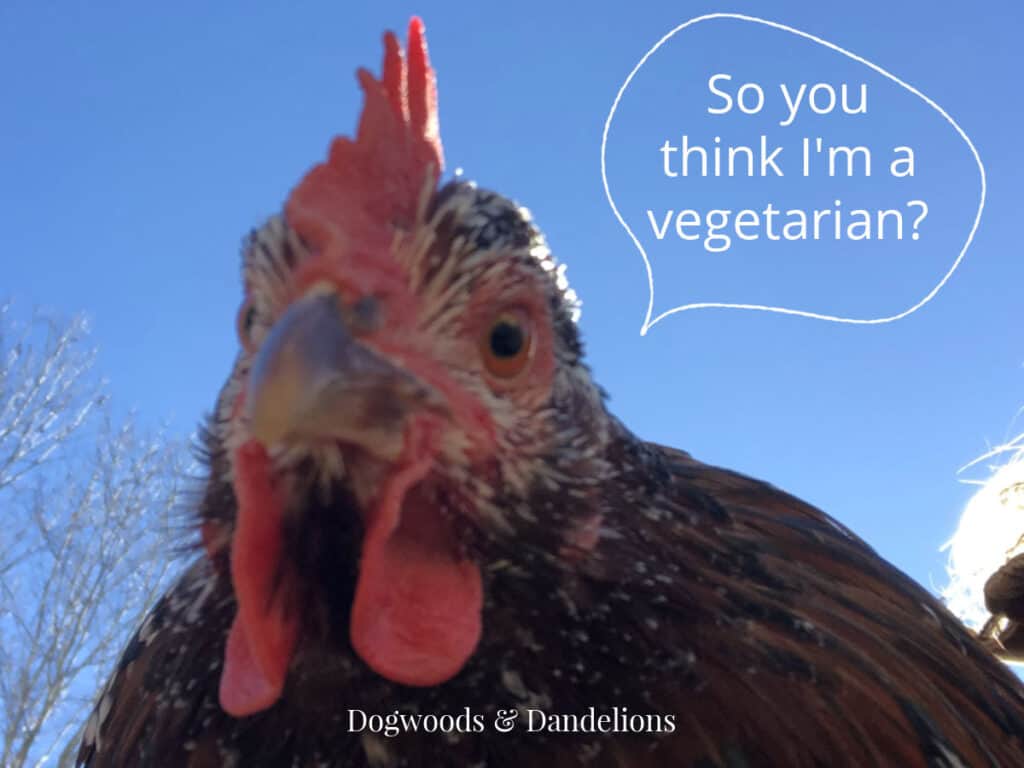
The Story Behind ‘Vegetarian’ Feed Labels
I’ve been wondering about the sudden rise of ‘vegetarian-fed’ labels on poultry products. When did these labels start? And why did consumers think vegetarian-fed chickens were a good idea?
It turns out that many people were concerned about what farm animals eat. And this sparked a major shift in the egg industry.
But I wanted to understand WHY egg farmers started feeding only plant-based food to their flocks.
Why Feed Chickens an All-Vegetarian Diet?
Well, many years ago, reports started surfacing that some commercial feeds included less-than-appetizing animal by-products – things like rendered feathers, roadkill, and even worse. Believe me, you don’t want to know all the details.
As you might expect, this news didn’t sit well with the public. We all want our food to come from clean, safe sources, right? Thus, there was a push for transparency in factory farms in the United States. What were the chickens actually eating?
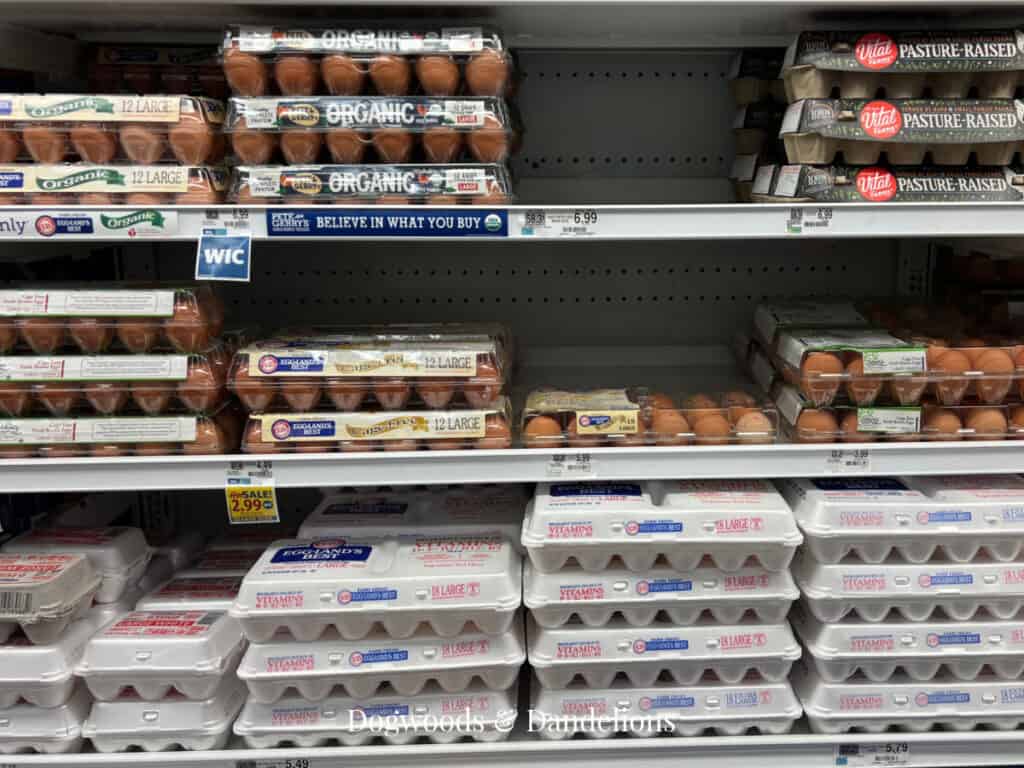
What was really the catalyst for change was the growing concern that the animal proteins being fed to the chickens might not just be unappetizing but could also pose health risks. When Bovine Spongiform Encephalopathy (BSE), also known as mad cow disease, became a greater threat in the food supply, people didn’t want to worry about getting the disease from their eggs too.
And let’s face it, ‘vegetarian-fed’ just sounds healthier and more natural to some folks. (It’s not, but it sounds good to many people.) The egg industry’s marketers caught on and began putting this tagline on egg cartons as a promise of purity and quality.
And since many consumers nowadays have no idea what a chicken eats, you get vegetarian fed chickens. So there you have it. A blend of consumer anxiety and smart marketing gave us the vegetarian-fed label we see today. (But since you are reading this article, I’m assuming you are trying to know more!)
Understanding Egg Carton Labels
Now that you understand what chickens eat in their natural environment and what prompted the vegetarian label on egg cartons, how do factory farms achieve vegetarian chickens?
To be considered vegetarian, chickens must be fed an exclusively plant-based diet, with no animal byproducts of any kind. But that doesn’t mean that the eggs are or are not organic.
Eggs marked with the USDA’s National Organic Program label come from uncaged hens that are free to roam in their houses and have access to the outdoors. The hens are fed an organic diet of feed produced without conventional pesticides or fertilizers. (Source: USDA website.)

So organic eggs can be pasture-raised, but not necessarily. See that part about “access to the outdoors?” That doesn’t mean that the chicken is free-ranging outdoors all day. The chickens may not have ever actually BEEN outdoors. It just means they have a way to get outside if they choose.
Free Range vs. Vegetarian Fed: A Comparison
Pecking through a pasture, free-range chickens exhibit their natural instincts as omnivores, eagerly searching for an assorted menu of insects, seeds, and plants.
In contrast, those raised on vegetarian feed consume a homogeneous mixture made of grains, corn, soy, and even supplements to replicate the essential nutrients found in their natural free-ranging counterparts. But no animal protein can be included.
Advocates for free-range farming argue that allowing chickens access to an area with ground to scratch in better aligns with the chicken’s evolutionary diet, ensuring the eggs they produce are rich in omega-3 fatty acids and other micronutrients.
On the other hand, vegetarian-fed hens may lay eggs that lack these naturally occurring nutrients. Critics of vegetarian-fed poultry argue that depriving chickens of a diverse diet may impact their health and the nutritional profile of their eggs. I know my free-range chickens have deeper yellow yolks than a carton of eggs from the store.
While both practices have their supporters, to me, what a chicken would eat if left to its own devices is what a chicken should eat. Period. The diversity of food found in a free-range diet is much more natural to a chicken than industrial “vegetarian” feed.
Health Benefits & Implications of What a Chicken Eats
The food hens eat on a day-to-day basis has a real impact on the eggs they lay. I notice that during the winter when there aren’t as many bugs and less green grass, the chicken egg’s yolks are paler.
Those happy hens darting around the farm or yard aren’t just burning off energy; they’re hunting down protein-packed snacks like insects and worms.
This isn’t just good for them; it’s great for us, too, because eggs from these free-roaming foragers are loaded with a better nutrient profile.
In stark contrast, consider hens living on a completely vegetarian diet. Sure, their food meets their basic needs, but it lacks the variety Mother Nature intended.
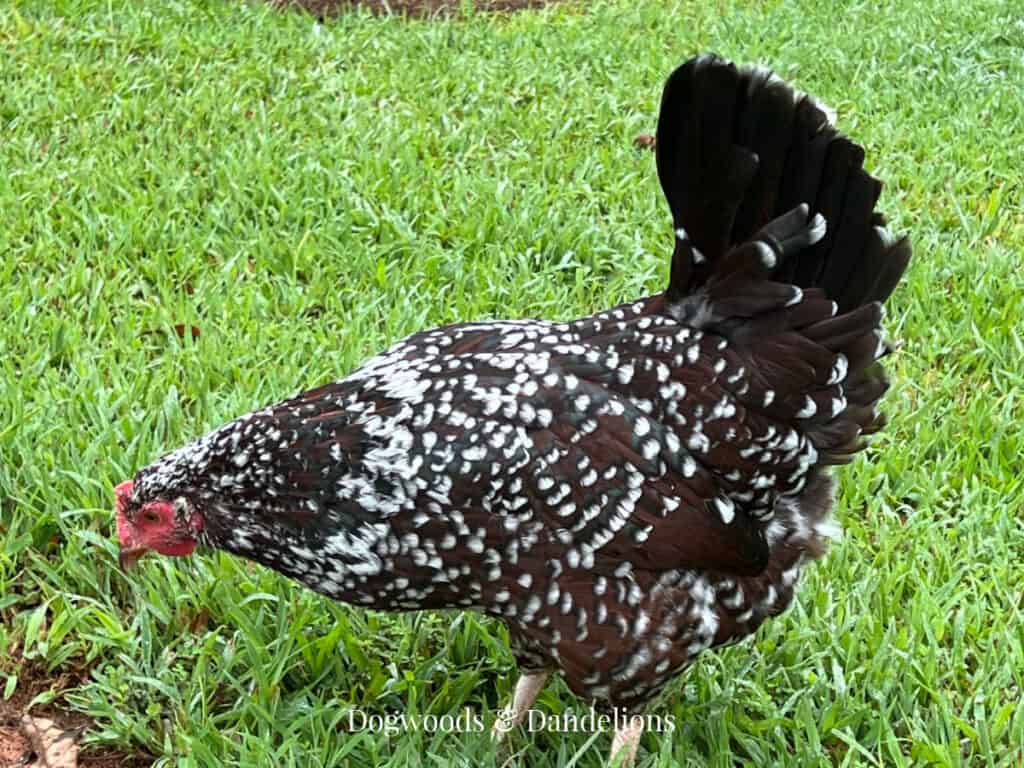
All the things they find while roaming about like grass to nibble on and the occasional grub make for a balanced diet, full of healthy proteins and also essential fatty acids and vitamins, which vegetarian feed can’t always provide. Just like humans, a varied diet from a variety of food sources makes for a healthier flock.
So when opting for eggs from chickens, try to find ones from chickens that were raised in a more natural setting. We’re not just treating our taste buds but also fueling our bodies with better nutrition—more omega-3s, and vitamins like B12 and D.
Should You Consider Backyard Chickens?
If you have read many articles on my blog, it is likely that you are interested in more than just egg carton labels. If you have the space and want to start your own flock of backyard chickens, I’ve got plenty of resources to help you get started.
And besides fresh eggs, raising chickens is a rewarding hobby that connects you to your food in a way buying from the store just can’t match.
Fresh eggs every morning from chickens you know personally? Sign me up! And chickens require much less space and are much easier to start with than most other farm animals.
Getting Your Own Backyard Chickens
But there are a few things to think about before jumping in head first with your own flock. First off, pick breeds that thrive in your local climate.
Each variety comes with unique needs, so figure out what works best around your homestead. If you can only have a few birds in your backyard, you’ll want to choose chicken breeds that lay lots of eggs.
You’ll also need a safe coop to fend off predators and shelter your birds from harsh weather. Chickens love having lots of space to roam, so aim for as large a run as you can, or opt for a movable coop that offers fresh ground regularly.
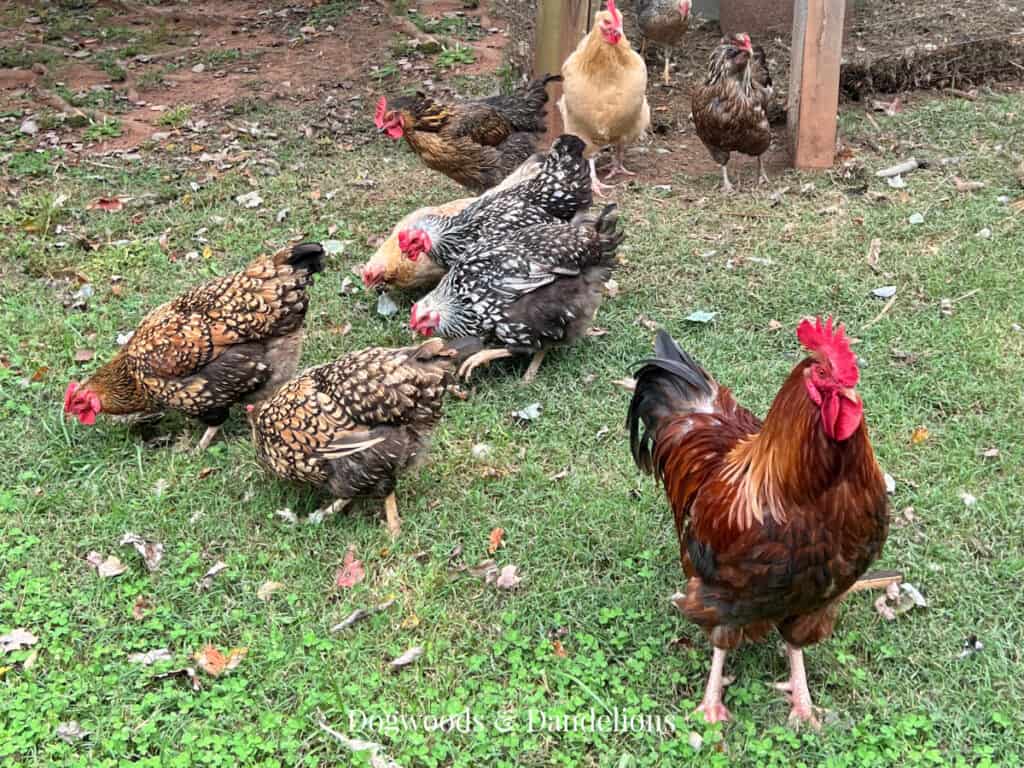
When it comes to their diet, a mix of quality commercial feed alongside some table scraps works well to produce the best backyard eggs. (Though too many table scraps may lead to a reduction in eggs.)
Toss in ample grit to help with your birds’ digestion and ensure they get their fill of bugs and greens while they forage. Worms, bugs, and all the tiny critters they hunt down don’t just satisfy their nutritional needs; it’s their idea of fun. Fresh water is a non-negotiable – always keep your flock’s waterers clean and filled.
Keep a regular check on your flock to look for any signs of sickness. Also, remember that chickens relish a pecking order; give them time to settle their social rankings.
If you want friendly hens, interact with them frequently. It fosters trust and makes handling them easier if a problem does arise. With these tips in mind, you’ll be all set to enjoy the clucking and the fresh eggs before you know it!
Selecting the Healthiest Option in the Egg Aisle
But if you can’t have your own chickens or just don’t want them, what kind of eggs should you buy? If possible, your best option is to find a local farmer to purchase your eggs from.
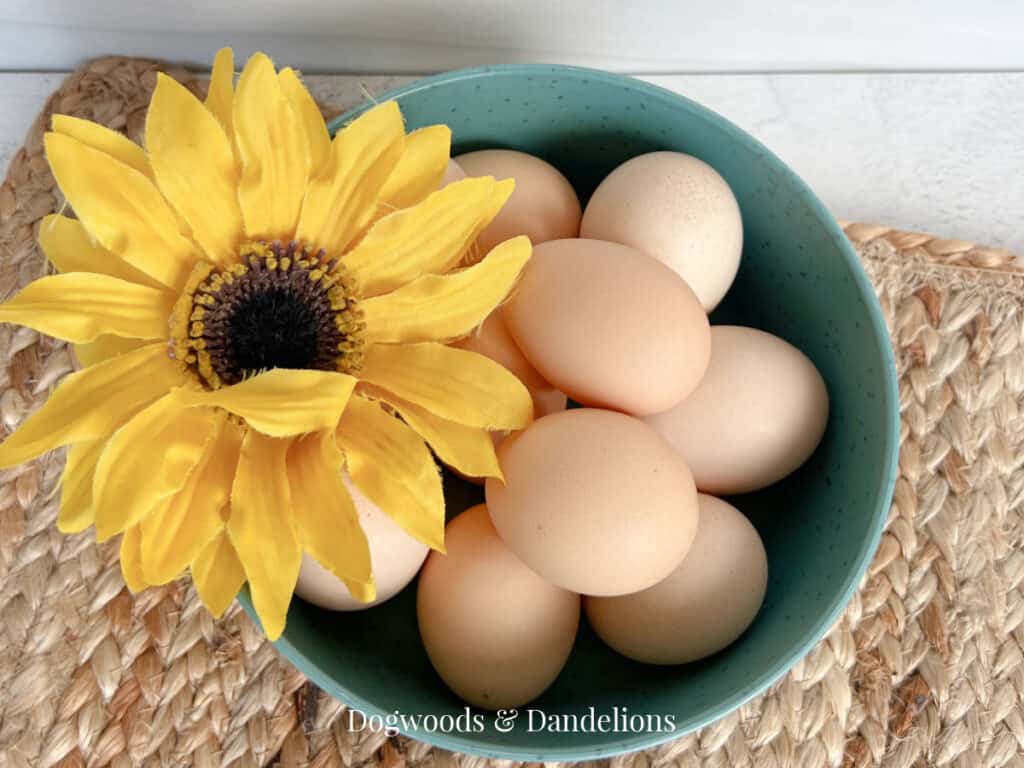
If you aren’t sure where the local farms are near you, visit your farmer’s market. There’s a good chance you will find high-quality eggs that are not vegetarian-fed.
Otherwise, try to find pasture-raised eggs at the grocery store the next time. That way, you know the chickens have been given room to roam outdoors and forage for bugs and worms as part of their daily diet.
In Summary
Chickens are Omnivores. They naturally eat a variety of foods, including insects and small animals as well as plant materials.
So the ‘vegetarian’ labels on egg cartons don’t mean the eggs are healthier (and most are actually less healthy) since they don’t reflect a chicken’s natural diet in the wild. The natural behavior of foraging and hunting provides chickens with vital nutrients that a solely vegetarian diet lacks.
Related Posts:
- Common Chicken Raising Questions That You Were Too Afraid to Ask
- Do you need a rooster in your flock to have fresh eggs?
- What is grit for chickens? Should you provide it for your flock?
- Foods you should not give to your chickens.

Meet Julie
I’m a farm girl born and bred in North Carolina. I’ve been growing a vegetable garden for over 20 years (and helping my Mom grow hers even longer). I’ve been raising chickens in my bathtub and backyard for 12+ years. I believe that homegrown food can be made simple. Let’s get started.
